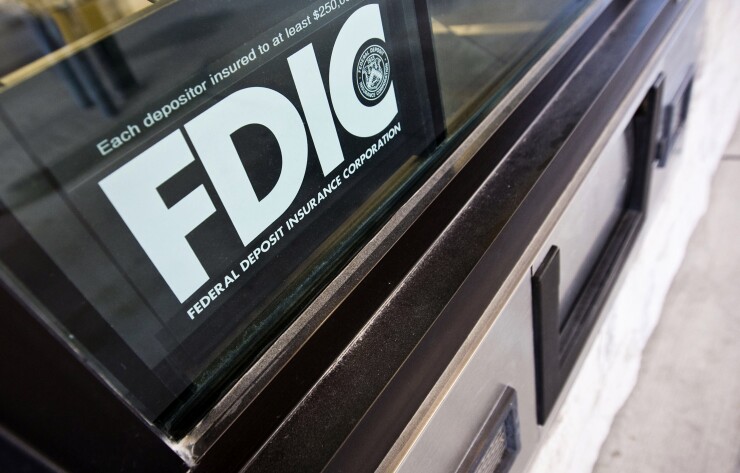Few things are as American as mom's apple pie and the Federal Deposit Insurance Corp. While most Americans understand the wholesome goodness that arises from a steaming crust containing baked apples, that same level of understanding cannot be said about the protections provided by the FDIC.
In short, the FDIC is one of the key reasons that the American banking industry is a world leader in safety and soundness. Insured deposits in financial institutions are protected if there are financial problems at the bank. That is the big differentiator for U.S. banks (technically, insured depository institutions): the FDIC protects customers in the unlikely event that the bank experiences difficulties.

Fintech companies are not as safe for customers as FDIC-insured depository institutions because the FDIC does not protect customer deposits if the fintech fails.
Fintech companies will commonly place commingled customer funds into a single bank account, and that account type can be known by various names: "pass-through," "fiduciary accounts," "omnibus," or "for benefit of" accounts. Regardless of the name, the fintech company is responsible for maintaining the information regarding the beneficial owners.
If the fintech fails, or for whatever reason the total funds that customers should have on deposit do not match what the fintech placed into the account, FDIC insurance is not triggered.
Only in the event that the bank failed, and if the bank and the fintech set up the account structure to meet the requirements for pass through insurance, would the customers be covered by FDIC insurance.
Put another way, customer deposits in fintechs are generally at risk to the financial performance of the fintech. This should be of concern to customers, and for their own protection, customers should avoid fintechs and seek the safety and security of insured depository institutions.
The digital asset industry recently witnessed the collapse of some of the larger nonbank deposit-taking firms in the industry, and customers were cut off from access to their funds. Voyager Digital and Celsius Network both had billions in customer deposits, and in July 2022 both firms sought the protection of Chapter 11 bankruptcy proceedings. Whether customers will eventually have access to those funds and be made whole is uncertain, at best.
There is no such thing as "too big to fail," and large investments in a company from well-known venture capital firms is no guarantee that the firm is managed prudently. Unlike most of the fintech industry, transparency and good governance are hallmarks of the U.S. banking system.
I do not know many people who will state that they like their bank, but, in general, in the United States people trust their banks to safeguard their funds. According to the agency, never, in the nearly 90-year history of the FDIC, has anyone lost even a single penny on an insured deposit.
The fintech industry has numerous participants who wish to borrow from this source of credibility, and perhaps the leaders in that effort are from the cryptocurrency industry.
Founders and startups with limited financial services experience seek to bolster their meager credentials for safekeeping other people's money by promoting that customer dollars are stored in FDIC-insured institutions.
Guess what? Of course, they are! That phrase is not much different than simply stating funds are stored in a bank, but the reference to the FDIC can be misinterpreted, and perhaps that result is what some firms were seeking.
It is very rare in the U.S. to find a bank that is not FDIC-insured, and if any exist, they are not members of the Federal Reserve System. The most often referenced non-FDIC bank is the Bank of North Dakota, which is fully backed by the state of North Dakota and is the only government-owned general service bank in the country.
The FDIC works with banks, and despite offering some similar products and services, fintechs are not banks. It is a serious violation for an uninsured institution to claim FDIC coverage. There is at least one cryptocurrency lender, almost masquerading as a bank with its mixture of products, which may have played fast and loose with its claim of coverage. It will be interesting to see if the FDIC and the Consumer Financial Protection Bureau pursues enforcement action. Cleaning up the bad actors is good for the industry and good for consumers.
The FDIC is an independent agency created by the Congress and backed by the full faith and credit of the U.S. government. It is important to note that the FDIC does not receive public funding, and instead it is funded by premiums paid by banks and savings associations for deposit insurance coverage.
The FDIC does more than provide deposit insurance. The agency examines and supervises financial institutions for safety, soundness and consumer protection; makes large and complex financial institutions resolvable; and manages receiverships.
The agency is an active and important member in the interconnected network of financial regulators in the U.S. that safeguard banks' safety and soundness. On the rare occasion that an insured institution experiences financial difficulty, it is the FDIC that steps in and manages the process of receivership. The FDIC protects the deposits of customers and the strength of the entire industry.
Fintechs may have some advantages in terms of flexibility and speed of change, but for consumers it is never a level playing field. Only insured banks have the safety and soundness protections that come with the oversight of the FDIC and other regulators, and one should never have to worry about the stability of the institution holding their money.
For years on American television there was a commercial in which a cartoon rabbit wanted to eat a bowl of children's cereal but was told he could not, as it was only for kids. When it comes to federal deposit insurance, many fintechs need a similar reminder: "Silly fintechs, FDIC is for banks."






